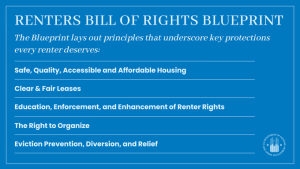 Recently in the news are proposals by the Biden administration regarding policies to allegedly protect rental tenants. According to the stories, multiple federal agencies are strongly considering taking actions that are designed to strengthen tenant protections and encourage rental affordability. Of course, experience has shown that well-intentioned government actions often do not have the intended results, and often worsen situations that they are designed to ameliorate.
Recently in the news are proposals by the Biden administration regarding policies to allegedly protect rental tenants. According to the stories, multiple federal agencies are strongly considering taking actions that are designed to strengthen tenant protections and encourage rental affordability. Of course, experience has shown that well-intentioned government actions often do not have the intended results, and often worsen situations that they are designed to ameliorate.
Due to the extreme reaction to the COVID-19 pandemic, there is currently a shortage of residential housing, especially in large cities. This is likely a result of the various eviction moratoriums during the pandemic, which resulted in tenants remaining in housing without paying rent. The effects of these moratoriums, even if they are no longer in effect, continues to the present day. Local landlord-tenant courts are still trying clear the backlog of eviction cases that occurred during the moratorium, especially in large cities such as New York. As a result, new renters are finding that, due to a shortage of supply, rental units have increased greatly in price, as the law of supply and demand has superseded governmental regulation.
The government is proposing executive action to direct the Federal Trade Commission to issue new regulations defining “excessive” rent increases, as well as other protections for renters, such as forcing landlords to wait at least thirty days before commencing eviction proceedings for non-payment of rent.
New York State is already one of the most heavily regulated states in the country regarding rental tenants, so it is not clear what effect the proposed new federal regulations would have on existing New York laws regarding rental units. The federal regulations would likely have a greater effect on jurisdictions that do not already have tenant-friendly rent regulations.
Another issue is the constitutionality of such federal regulations. Rental housing is traditionally an area of the law that is regulated at the local and state level. It is unclear whether the federal government has to power to regulate local rental markets. Of course, the recent history of the federal government has shown an increased willingness to increase its power, at the expense of local and state governments. The COVID-19 pandemic resulted in federal regulation of personal health decisions, unprecedented in our nation’s history. The Biden administration has refused to lift the “emergency” status relating to COVID-19, a decision which obviously allows them to exercise greater power over the everyday lives of American citizens.
It should be noted that, in New York State, regulation of the residential renting market was originally introduced as an “emergency measure” immediately after World War II, in response to a post-war housing shortage. The “emergency” has continued in New York for over 75 years, with no end in sight. Rent regulations continue to govern many New York City housing units to the present day. Will the U.S. government use the endless COVID-19 “emergency” to impose similar regulations at the federal level?
Our firm will continue to monitor the attempts of the Federal Government to introduce new regulations concerning the residential housing market, and will advise our readers of their effects on the New York rental market for both landlords and tenants.
 New York Real Estate Lawyers Blog
New York Real Estate Lawyers Blog

